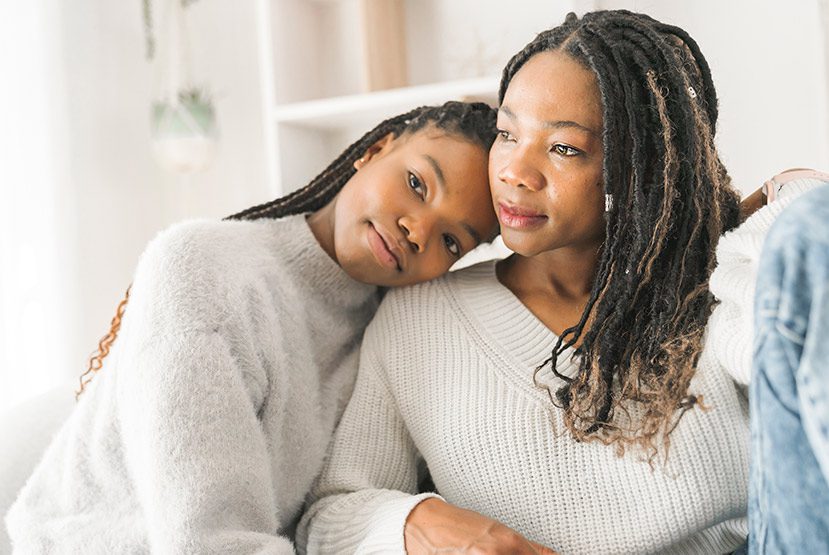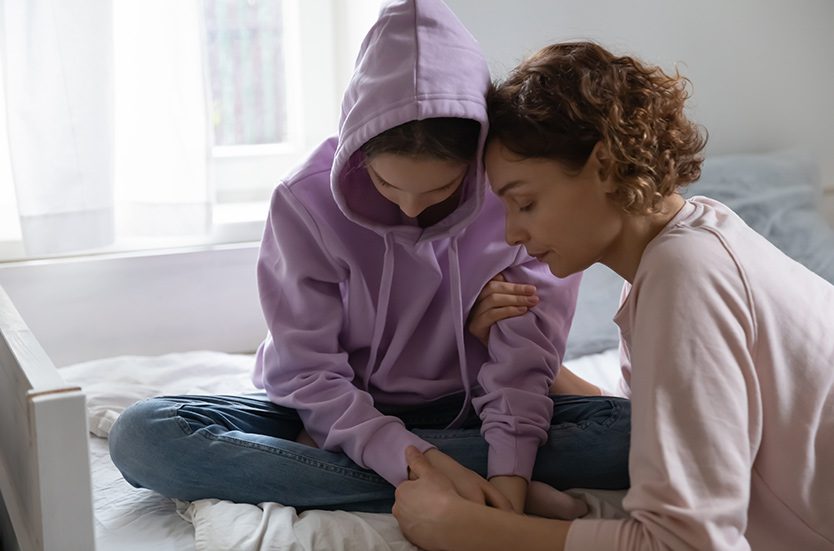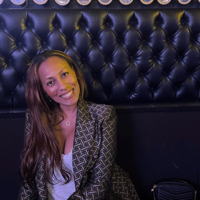How to Be a Healthy Parent: Interesting Advice From My Therapist
A few weeks ago, I called my therapist, Ellen, desperate for help. My daughter was going through a challenging situation with her friend Samantha, and I felt helpless. Part of me knew I was getting too involved in her drama. I needed advice on how to be a healthy parent.
Exasperated, I asked, “What can I do to help her?!”
Even as I said these words, I knew I needed to regroup. I was taking on her problems way more than I should.
With a calm, relaxed voice, Ellen said, “Show her the book. Have her take a look at the diagrams. Empower her with this information. And make sure you are staying off the triangle, too! You must also revisit these ideas because good parenting requires it!”
I knew the book she was talking about! Breaking Free From the Victim Trap is about codependency. Ellen gave it to me 18 years ago as I struggled to get through an excruciatingly painful divorce. Still, I couldn’t understand why she was recommending it to me at that moment.
Later, as I looked through the diagrams with my daughter and we talked about the content, I could see the problem. I could see how I needed to course-correct and become healthier!
Establishing healthy boundaries:
It’s a big shift to go from being 100% responsible for your child to giving her the space and freedom to make mistakes, face challenges, and learn from them.
Breaking Free From the Victim Trap dives into the unhealthy patterns that can develop as you navigate relationships of all kinds. I could see immediately that I was slipping into some tricky territory.
Here are some of the things I needed to learn (and relearn):
The victim triangle as a resource on how to be a healthy parent:
“The Karpman Drama Triangle defines the roles people take on (and can switch between) in stressful, emotional, or high-conflict situations. Dr. Stephen Karpman identified three leading roles: the persecutor, the victim, and the rescuer.
We can often find ourselves drawn to a particular role. However, the reality is that we move around the three roles. Different circumstances pull us towards one specific pattern of behavior or another.” – says Dr. Kathryn Kassell.
Dr. Karpman developed the triangle to help clarify dysfunctional family dynamics – many involving addicts. Maybe that’s why it was hard to think of using the triangle in the context of parenting. But on closer look, I could see my therapist’s point. It wasn’t just about dysfunctional family dynamics. It’s about all interpersonal relationships, and I needed a reminder.

How does this triangle work?
The triangle has three positions – the victim, the rescuer, and the persecutor. All three are victims as they hop around on the triangle changing positions.
According to the author, the victim is essentially powerless (more on this later). Victims are continually enabled by a rescuer who feels an overwhelming desire to feel needed. The victim and/or rescuer then becomes a persecutor – attacking others for their problems.
My counselor Ellen says, “You must stay off the triangle! It’s not helping her or you.” She also said, “In most families, I work with, everyone is on the triangle. We don’t have role models in our society that demonstrate healthy behavior. It’s challenging work. But so worth it!”
Let’s take a look at some of the positions on the triangle:
1. The victim role – avoid victimizing your child and yourself to be a healthy parent.
According to Diane Zimberoff of Breaking Free From the Victim Trap, “The victim is the person who feels helpless and sorry for himself. He blames other people for his problems.”
It may seem counterintuitive – but if I’m becoming emotionally entangled in everything going on with my daughter, I’m making myself a victim. I feel helpless, powerless, and affected by things I can’t control.
I’m also victimizing my daughter and sending her the message, “THIS IS SO HARD! I feel so sorry for you! You shouldn’t have to go through this!“ My behavior encourages her to believe she also has little power.
Another way of seeing it:
No matter how you look at it – we have choices—every single moment of every single day. We choose how we’re going to perceive everything that happens to us.
Thinking this way reminds me of Glennon Doyle’s quote from Love Warrior:
“You are not supposed to be happy all the time. Life hurts, and it’s hard. Not because you’re doing it wrong, but because it hurts for everybody. Don’t avoid the pain. You need it. It’s meant for you. Be still with it, let it come, let it go, let it leave you with the fuel you’ll burn to get your work done on this earth.”
So, a better message is:
Going through hard things is part of life. You aren’t a victim. You are living! And there are opportunities for growth within every challenge that comes along.
2. The rescuer – a slippery slope that derails you from being a healthy parent.
This is my default role, for sure. The rescuer jumps in and does things for others they can do for themselves.
Lately, it seems the trend is to over-parent. In some ways, it can be linked to rescuing. When we’re not letting our kids experience the consequences of their actions, we’re blocking their growth. We’re actively trying to remove any painful experiences.
Brene Brown has other advice. Her Wholehearted Parenting Manifesto says, “Together we will cry and face fear and grief. I want to take away your pain, but I will sit with you and teach you how to feel it.”
In my case, I need to say, “Instead of jumping in and rescuing you, I will instead choose to hold space for you to feel everything you need to feel.” When I do this, I send the message: “Yes, this stinks! But all is well. This will be okay. You are strong and capable of managing even something as hard as this.”
Ellen also suggests saying things like:
Is there anything I can do to support you?
I love you and know this will pass.
3. The persecutor – a healthy parent, steers clear of this role.
The persecutor comes in many forms, but the overriding theme is having anger and aggression toward someone they perceive has wronged them.
Back to the situation with my daughter and her friends, I could say, “Samantha is such a mean girl! I can’t believe she excluded you!” In two seconds, I jump onto the triangle and attack the person I feel is at fault.
My emotional entanglement once again strips me of power. This is how not to be a healthy parent.
I might also even turn this anger toward my daughter. I might think or say, “You’re so immature! Why do you continue to take this so personally”?
Both of these things aren’t good! I have no control over how other people in her life treat her. Also, I have no control over the pace she needs to move to process things her way. I can only work on how I treat her and work toward better management of my own emotions.

Ellen’s better idea:
Instead of becoming entangled, I need to stay clear and healthy. I want to tell my daughter that I believe in her. I know she’s got this.
Important note:
I need to stay emotionally in check and remain empowered and healthy.
I can allow the drama with my teen to impact me and take over – or I can choose not to let it and focus on being a healthy parent. When I find myself becoming overly entangled, I need to take a good look at myself.
Where are my fears and worries coming from? Is this a valid concern – or is this normal teenage growth and drama? Am I projecting my thoughts and fears onto my daughter?
Maybe I need to pause, find healthy ways to support my daughter, and practice self-care.
The goal:
My ultimate goal is to model healthy behavior for myself and as a parent. What does that look like? Have I forgotten that I have personal power? Instead of behaving reactively, I can show her that I’m responsible for how I experience things happening around me every day.
I can say instead, “I’m sorry that you’re going through this challenging time with Samantha. I’m here for you if you want to talk or if you want to do something fun to take your mind off of this.”
I let her know that I love her.

One final thought:
We’re here to live big, full lives; through that living, we’ll experience incredible highs and some disappointing lows. All this is happening to grow us into who we’re capable of being. Maybe the sooner they learn that life will be challenging – the better.
I wonder if this all comes from the separation that occurs as we become mothers raising young adult children. It’s too hard, but we (me!) have to learn to trust and let go. One thing that’s become clear to me is that she has her path. And it’s not the one I’ve written for her.
But actually, a higher plan. And she’s already on her way! All she has to do is look down at the yellow brick road beneath her feet.
Alas, you can see how motherhood has been my greatest teacher!
Do you have compassion for yourself as a mom? See my conversation with Dr. Barbara Green on the importance of self-compassion.
Do you have any thoughts to add on this topic? Have you ever found yourself to be moving around the triangle? Let me know! I’d love to hear.







Leave a Reply
Want to join the discussion?Feel free to contribute!